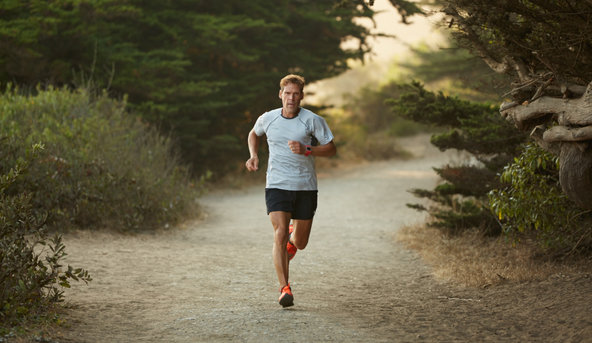
Dean Karnazes is planning a 12-day running journey following the ancient Silk Road through Uzbekistan, Kyrgyzstan and Kazakhstan.Credit
On Wednesday, Dean Karnazes, an American ultramarathon runner, will begin a 12-day, 326-mile run along the Silk Road, part of an ancient trade route through Uzbekistan, Kyrgyzstan and Kazakhstan. He’s doing it as part of the State Department’s sports diplomacy program — and because he really likes to run. Through the years, Mr. Karnazes has run 350 miles straight (with no sleep), completed a 200-mile relay race (by himself), run across Death Valley in the middle of the summer, and run a marathon at the South Pole.

Credit The New York Times
Recently I caught up with Mr. Karnazes by phone at his home in Marin County, Calif., as he was getting ready to leave for his trip. He told me what interested him in the Silk Road (it was a stranger he met at the San Francisco Marathon), what traditional Greek food he’s taking along on his journey, and why, despite his extraordinary achievements, he’s just a bit worried about this challenge. Here are edited excerpts of our conversation.
Ten years ago, you ran 50 marathons in 50 states in 50 days. What made you decide to go beyond traditional races — and ultras — and do something like this?
The spirit of exploration. I had done hundreds of organized races and loved racing, but I also loved the thrill of conceiving an adventure on my own and seeing whether the impossible was possible.
I wasn’t sure I would be able to run 50 marathons back to back. What it taught me was that the human body is more remarkable than what we realized. If we can just get out of the way of our perceived limitations, we’re really capable of extraordinary things.
Did completing those 50 marathons change how you approached future long-distance ventures?
There were mornings where I couldn’t even roll out of bed. I thought, “I can’t even step out of bed today, and this is the ninth marathon, and I have to do this 41 more days in a row — how is this possible?” I just committed to doing the best that I could every day.
At the end of 50 days, it was telling that the 50th marathon, which was the New York City Marathon, was the strongest and my fastest of all 50.
Why do you think your last marathon was your fastest?
I was just so glad to be done with it. With that final marathon, I was able to let it all out and not worry about having to get up the next morning and have to run another marathon. I ran the New York City Marathon in three hours 30 seconds. That’s a pretty respectable marathon time.
What’s been your favorite epic trek so far?
I’ve run on all seven continents of earth twice now. I’ve run in some of the most remote and exotic places. But my pinnacle achievement was running a 10K with my daughter on her 10th birthday. I didn’t think she was going to make it at five miles, and she said, “Dad, I can do this.” She let out a grunt and started sprinting. To me to see that, I saw her finally as her own person, and I saw resolve in her that I’d never seen before.
How old is your daughter now? Does she run?
She’s 20. She’s a recreational runner.
What brought you to the Silk Road?
I was running the 2015 San Francisco Marathon and a guy came up next to me. This happens quite a bit — people recognize me on the course and they come up next to me and we chat. He started explaining to me that he worked for the State Department and was based in Kyrgyzstan. That led to me asking, “Is there running there? Recreational running?”
He went on to disclose that he’d been seeking me out and said, “I’ve got this idea that I want to pitch to you. I want you to follow in the footsteps of Alexander the Great.”
I’m thinking this is just a fantasy, this guy. But his State Department contacts, they put a proposal in front of me. I’m very bad at saying no, and this sounded too good to be true. So I said yes.
How do you prepare for a trip like this?
If you saw this agenda — when I first looked at it, I thought, “They’re going to kill me.”
I’ve been watching the weather. Uzbekistan is right above Afghanistan. It’s desert. It’s 112 degrees. So I’ve been running in the mid-day heat, which a lot of runners don’t do. Also something runners don’t do: I’ve been purposefully dehydrating myself and running without water to get used to the fact that I’m not going to have consistent support out in some of these more remote areas.
Another thing I’ve been doing is running a lot of mountains, because I’m climbing a path that’s nearly 12,000 feet high. That’s a pretty significant pop. Heartbreak Hill at the Boston Marathon is 236 feet.
I’m sure there are going to be a lot of unforeseen situations. Cell reception there is apparently really spotty. I don’t know what’s going to happen if I get lost out there.
Tell me about your fueling strategy.
I’m going to take some products that we’re used to seeing. I’ll take some Hammer Nutrition products and some electrolyte powder to mix with water. But I’m going to try to rely mostly on the local foods. For example, in Greece I found this stuff called pasteli. It’s honey and sesame seed. I thought, “Wow, this is better than any gel pack I’ve ever had, and it’s more sustaining.”
Where will you sleep?
I’m homesteading with families along the way, including staying in a yurt.
You’re planning to run some 50 miles a day – and also holding clinics and talks, and inviting people to join in along the way. How come?
The three countries I’m visiting are celebrating 25 years of independence from the Soviet Union. The idea is to link these three countries together on this footpath. The power of running — it unites people.
There’s a magic in running. It’s so simple, it’s a commonality we all share as a species. We’re divided by the color of our skin, divided by the God we believe in, socioeconomic level, whatever else, but running’s a great democratizer. The idea is to get people to come out and run along with me, to show together the power of running. That’s the whole idea behind this sports diplomacy program.
What do you hope to achieve?
It’s a great adventure. I’ve always wanted to see and visit the Silk Road. I’m going to be pushing my body to the limits, and my mind as well. I really like that intensity of staying focused, and the discipline of running great distances and showing up and giving a talk and being coherent and cohesive when you’re about ready to fall over.
What’s next?
I’m planning on a global expedition to try to run a marathon in every country of the world in a one-year time span. So in 2017 I’m taking off on a global trek.
What advice do you have for nonprofessional runners who might be trying a similar challenge, like running across America?
You don’t have to go fast. You just have to go. It’s just relentless forward progress. I’ve run across the country a couple times now, one self-supported, one with a crew. Prepare for tremendous highs, and also tremendous, tremendous lows, where you just feel like, “I might not be able to make it. I might not be able to get out of bed this morning.”
Every day, press onward, even if that means walking. The other thing on the flip side is not to lose sight of the adventure itself, to not to be so goal-oriented that all you want to do is just make it. Enjoy the journey.
You can follow Mr. Karnazes’ trip at https://eca.state.gov/ultramarathon. The State Department will be posting updates on Twitter at twitter.com/sportsdiplomacy, and on Instagram at instagram.com/sportsdiplomacy. Those sites will include updates from FitBit, a sponsor of Mr. Karnazes.
Jen A. Miller is the author of “Running: A Love Story.”
Related:
- Living to 100 and Beyond
- Running for the Wrong Reasons
- Walk, Jog or Dance: It’s All Good for the Aging Brain
Interested in running? Sign up to receive practical tips, expert advice, exclusive content and a bit of motivation delivered to your inbox every week to help you on your running journey.






